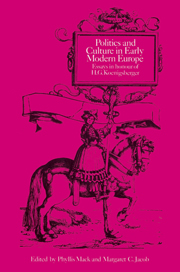Book contents
- Frontmatter
- Contents
- Introduction
- The court of the Spanish Habsburgs: a peculiar institution?
- The magnificent Lorenzo de' Medici: between myth and history
- Political rhetoric and poetic meaning in Renaissance culture: Clément Marot and the Field of Cloth of Gold
- The unlikely Machiavellian: William of Orange and the princely virtues
- The Estates of Brabant to the end of the fifteenth century: the make-up of the assembly
- Presents and pensions: a methodological search and the case study of Count Nils Bielke's prosecution for treason in connection with gratifications from France
- Between Bruni and Machiavelli: history, law and historicism in Poggio Bracciolini
- Constitutional discourse in France, 1527–1549
- Lieuwe van Aitzema: a soured but knowing eye
- John Calvin's contribution to representative government
- Luther and the humanists
- Scholars and ecclesiastical history in the Early Modern period: the influence of Ferdinando Ughelli
- ‘By an Orphean charm’: science and the two cultures in seventeenth-century England
- The crisis of the European mind: Hazard revisited
- Isaac Beeckman and music
- Decadence, shift, cultural changes and the universality of Leonardo da Vinci
- Bibliography of the writings of HELMUT GEORG KOENIGSBERGER
- Index
The magnificent Lorenzo de' Medici: between myth and history
Published online by Cambridge University Press: 20 October 2009
- Frontmatter
- Contents
- Introduction
- The court of the Spanish Habsburgs: a peculiar institution?
- The magnificent Lorenzo de' Medici: between myth and history
- Political rhetoric and poetic meaning in Renaissance culture: Clément Marot and the Field of Cloth of Gold
- The unlikely Machiavellian: William of Orange and the princely virtues
- The Estates of Brabant to the end of the fifteenth century: the make-up of the assembly
- Presents and pensions: a methodological search and the case study of Count Nils Bielke's prosecution for treason in connection with gratifications from France
- Between Bruni and Machiavelli: history, law and historicism in Poggio Bracciolini
- Constitutional discourse in France, 1527–1549
- Lieuwe van Aitzema: a soured but knowing eye
- John Calvin's contribution to representative government
- Luther and the humanists
- Scholars and ecclesiastical history in the Early Modern period: the influence of Ferdinando Ughelli
- ‘By an Orphean charm’: science and the two cultures in seventeenth-century England
- The crisis of the European mind: Hazard revisited
- Isaac Beeckman and music
- Decadence, shift, cultural changes and the universality of Leonardo da Vinci
- Bibliography of the writings of HELMUT GEORG KOENIGSBERGER
- Index
Summary
We make certain historical figures into cultural heroes and grant them an afterlife ofttimes richer and filled with more rewards and recognition than their actual chronological lives. Lorenzo de' Medici is one of them. Mention his name, and vivid and striking images of the golden age of Florence and the Renaissance spring to mind. Lorenzo the Magnificent plays a double role for us. He is that historical person who lived in fifteenth-century Florence, and at the same time, he is a symbol of his age. As with many a figure from the past, historians can study his thought and actions through contemporary records, through his own copious correspondence and other primary sources, but those historical documents are hardly adequate sources for an analysis of his larger symbolic role.
Historical myths present special difficulties for the historian, first of all because it is not clear exactly what they are. They exist somewhere between myth and history. Like myth they are expressions of collective belief, but not disembodied belief devoid of connections to established fact. Rather they acquire significance precisely because they are beliefs about the past. The subjects of historical myths, men like Lorenzo de' Medici or George Washington, are the curious stepchildren of history because they combine elements of both myth and historical reality. They are similar to the ancient Greek demigods or Roman emperors who people believed were haif-mortal, half-divine, neither entirely one nor the other.
- Type
- Chapter
- Information
- Politics and Culture in Early Modern EuropeEssays in Honour of H. G. Koenigsberger, pp. 25 - 58Publisher: Cambridge University PressPrint publication year: 1987
- 1
- Cited by

